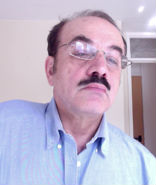
|
Keynote Speaker:
Professor Habib F. Rashvand
Univ. of Warwick, UK
E-mail: rashvand.editor@gmail.com
|
Abstract:
The cycles of innovation usually bring in some form of technological revolution, these often come and go without a trace or are unnoticed by most people and societies caught in the process. The effects are, however, very different from those who are ready to follow the process. We technocrats therefore must always know our position and hold ourselves in readiness to harness these cycles so as to help our nations towards prosperity and a better life-style.
Today sensor technology centres the innovation cycle. Over a decade domination of the wireless sensor network (WSN) has been building over the concept of distributed smart sensing, and is climbing to its peak. We see signs that it cannot follow its sustainable progress without demonstrating some new superior, world class/scale applications and services. Due to its heterogeneous nature such practical applications can only develop in conjunction with other fields and disciplines. Examples are all around us. Any automated, smart, and intelligent service can fall into this category. Smart medical systems, smart agriculture, smart manufacturing, smart energy, smart transport, and many more to include our favourites: smart homes, smart offices, smart cities and beyond. A whole range of new exciting and adventurous opportunities that require all three stages of research, development and deployment (RDD) are waiting to spark/shake the new economies. In order to achieve such complex long-term RDD projects we need to follow an integrated multidisciplinary solution, under a fully controllable and trustworthy complex system.
This keynote speech therefore, under the complex smart service economies (CSSE) examines: (a) the main CSSE components, (b) the key success factors of CSSE, (c) the simplification process, and (d) the role of two key technologies of ubiquitous and overlay for service deployment and management.
Finally, for our special case of integrated WSN-IoT smart systems, as a typical example of deploying smart integrated services some more specific details are discussed to justify the case for its key functions and its research requirements.
|
Biography:
Habib F. Rashvand is Professor at University of Warwick, United Kingdom. With over 30 years a proven industrial and academic experience in Data Communications, Computing, and wireless sensor technologies has been serving the IET Communications and IET Wireless Sensor Systems for over a decade. His industrial experience includes Racal, Vodafone, Nokia and Cable & Wireless with many universities, Zambia, Portsmouth, Coventry, Magdeburg and Warwick with an overlapping 10 years teaching technological Innovations at the Open University. Director of Advanced Communication Systems, with Special Interests in innovation, engineering management, wireless sensor systems and distributed systems, over 100 publication records including first author of three books “Using Cross-Layer Techniques for Communication Systems: Techniques and Applications” (IGI Global, by H. F. Rashvand and Y. S. Kavian, 2012), “Distributed Sensor Systems: Practice and Applications” (Wiley, by H. F. Rashvand and Jose M. A. Calero, 2012) and upcoming Book “Dynamic Ad-Hoc Networks” (IET, by H. F. Rashvand and C. H. Chao, Expected July 2013).
|
|